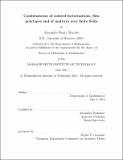Combinatorics of colored factorizations, flow polytopes and of matrices over finite fields
Author(s)
Morales, Alejandro Henry
DownloadFull printable version (996.4Kb)
Other Contributors
Massachusetts Institute of Technology. Dept. of Mathematics.
Advisor
Alexander Postnikov.
Terms of use
Metadata
Show full item recordAbstract
In the first part of this thesis we study factorizations of the permutation (1; 2,..., n) into k factors of given cycle type. Using representation theory, Jackson obtained for each k an elegant formula for counting these factorizations according to the number of cycles of each factor. For the case k = 2, Bernardi gave a bijection between these factorizations and tree-rooted maps; certain graphs embedded on surfaces with a distinguished spanning tree. This type of bijection also applies to all k and we use it to show a symmetry property of a refinement of Jackson's formula first exhibited in the case k = 2; 3 by Morales and Vassilieva. We then give applications of this symmetry property. First, we study the mixing properties of permutations obtained as a product of two uniformly random permutations of fixed cycle types. For instance, we give an exact formula for the probability that elements 1; 2,..., k are in distinct cycles of the random permutation of f1; 2,..., ng obtained as product of two uniformly random n-cycles. Second, we use the symmetry to give a short bijective proof of the number of planar trees and cacti with given vertex degree distribution calculated by Goulden and Jackson. In the second part we establish the relationship between volumes of ow polytopes associated to signed graphs and the Kostant partition function. A special case of this relationship, namely, when the graphs are signless, has been studied combinatorially by Postnikov and Stanley and by Baldoni and Vergne using residues. As a special family of ow polytopes, we study the Chan-Robbins-Yuen polytope whose volume is the product of the consecutive Catalan numbers. We introduce generalizations of this polytope and give intriguing conjectures about their volume. In the third part we consider the problem of finding the number of matrices over a finite field with a certain rank and with support that avoids a subset of the entries. These matrices are a q-analogue of permutations with restricted positions (i.e., rook placements). Extending a result of Haglund, we show that when the set of entries is a skew Young diagram, the numbers, up to a power of q - 1, are polynomials with nonnegative coefficients. We apply this result to the case when the set of entries is the Rothe diagram of a permutation. We end by giving conjectures connecting invertible matrices whose support avoids a Rothe diagram and Poincaré polynomials of the strong Bruhat order.
Description
Thesis (Ph. D.)--Massachusetts Institute of Technology, Dept. of Mathematics, 2012. This electronic version was submitted by the student author. The certified thesis is available in the Institute Archives and Special Collections. Cataloged from student submitted PDF version of thesis. Includes bibliographical references (p. 123-127).
Date issued
2012Department
Massachusetts Institute of Technology. Department of MathematicsPublisher
Massachusetts Institute of Technology
Keywords
Mathematics.